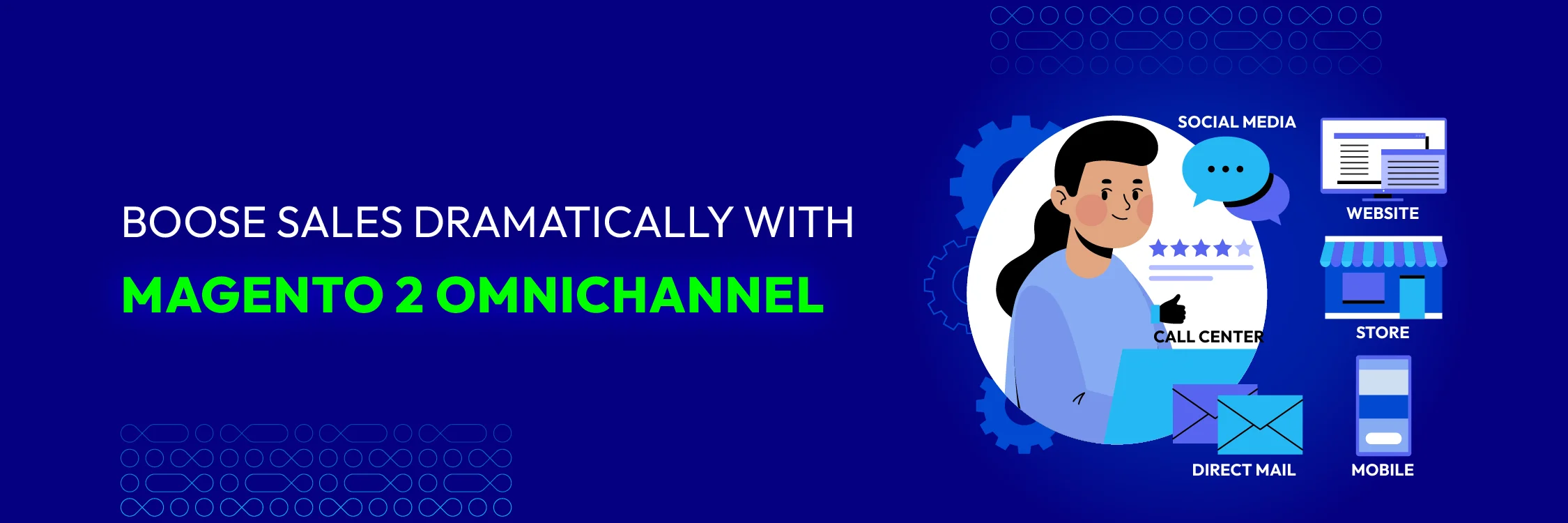Hyvä Theme is Now Open Source: What This Means for Magento Community - Mageplaza
Hyvä is now Open Source and free. Discover what changed, what remains commercial, how it impacts the Magento ecosystem, and how to maximize its full potential.

A Harvard Business Review survey found that 73% of consumers shop using multiple channels, highlighting the importance of adopting an omnichannel approach to meet modern consumer expectations.
Omnichannel Magento 2 facilitates a unified customer experience, streamlines operations, boosts sales, and enhances customer loyalty. This guide explores what Omnichannel Magento 2 is and provides practical steps to leverage its features to transform your retail business.
Omni-channel statistics refer to data and metrics that track the performance and interactions across multiple channels, providing a comprehensive view of customer engagement and sales. Here are some more crucial omnichannel statistics.
Marketers using over three channels: 494% higher order rate
Omnichannel campaigns that used SMS: 429% higher conversion rate
Omnichannel campaigns that included push messages: 614% order rate

Omnichannel retail is a unified approach to commerce that offers customers a seamless shopping experience across multiple channels and touchpoints. This strategy combines a brand’s online store with its physical presence, making it easy for customers to shop and interact with your Magento store.
Your Magento store can offer a seamless experience at various touchpoints, including:
Online stores
Physical stores
Mobile apps
IoT (Internet of Things) devices
Social media
Email campaigns
Newsletters
Omnichannel ensures a consistent experience and addresses how customers feel at different stages of their shopping journey.

Multichannel retail involves selling products through different channels, like websites and physical stores.
Multichannel retail means selling products through various channels like websites, physical stores, social media, and online marketplaces. Each channel operates separately, offering different ways for customers to connect with the brand. While it provides many options for buying products, there’s often little coordination between these channels. This can lead to different prices, availability, or customer service experiences depending on where customers shop.
Omnichannel retail, in contrast, focuses on creating a seamless, integrated experience across all channels with the customer at the center. It’s about understanding and meeting the customer’s needs consistently, no matter where they are. Omnichannel strategies might include integrating ads into at-home streaming services, and reaching customers before they visit the online store. The goal is to provide a unified journey where customers can move smoothly between channels without encountering differences or interruptions.
Read more: Omnichannel vs Multichannel Ecommerce: Which is Better?
An omnichannel retail approach caters to modern customer demands by offering a unified shopping experience across all contact points. It enables customers to switch between devices and channels smoothly, keeping them engaged and satisfied throughout their purchase journey.
A well-implemented omnichannel strategy can increase conversion rates and customer retention. By providing a personalized shopping experience, customers are more likely to buy and remain loyal to the brand.

Omnichannel unifies inventory management across all channels, optimizing stock levels and reducing out-of-stock situations. This improves supply chain management, leading to cost savings and higher customer satisfaction.
Omnichannel retail helps collect and analyze data from various channels, providing valuable insights into the customer journey. This data can drive marketing campaigns and promotions, offering better product recommendations across different touchpoints.
A study by the Harvard Business Review found that omnichannel customers spent 4% more in-store on average. Approximately 73% of these customers used multiple channels while shopping.
Following an omnichannel experience, 23% more customers returned to shop at the retailer’s stores. These customers were also more likely to suggest the brand to family and friends compared to those who used only one channel.
Marketers who used three or more channels in a campaign saw a 287% higher purchase rate compared to those who used only one channel.
According to research by Forbes, companies with strong omnichannel customer engagement retain about 89% of their customers, while those with weak omnichannel strategies retain only 33%.
Magento 2 is a powerful eCommerce platform designed to help retailers create an effective omnichannel strategy.
Magento 2’s responsive design works on various devices and screen sizes, ensuring a smooth experience on desktops, tablets, and mobile phones.
Magento 2 uses data to create personalized shopping experiences, including:
Tailored product recommendations
Special promotions
Content based on individual preferences.

Magento 2 lets retailers manage multiple online stores from a single admin panel, ensuring a consistent experience across different regions and channels.
Magento 2 supports multiple sales channels, allowing retailers to reach customers through:
Social media
Marketplaces
Physical stores
Web stores
In-store POS systems.
Magento 2 has strong inventory management features. Retailers can track stock levels across different channels and warehouses, including physical store inventories. It allows setting inventory rules and configuring stock alerts to ensure customers always see accurate inventory data.
Magento 2 provides a customer management system that stores detailed customer profiles, including communication logs, order history, and preferences. Retailers can utilize this data to categorize customers, enhance customer service, and develop focused marketing campaigns.
Magento 2 captures and stores sales data from all channels, offering a unified view of sales performance. This helps generate reports, analyze trends, and make better decisions to optimize the eCommerce store.

Magento 2’s flexible architecture allows integration with various third-party plugins. Popular options for omnichannel include:
CRM systems for enhanced customer relationship management.
Marketing automation platforms to automate and streamline marketing campaigns.
ERP systems for comprehensive business management and integration of backend operations.
POS systems to synchronize online and offline sales data.
Integrate Magento with ERP (Enterprise Resource Planning) systems to automate order processing and sync inventory data across all channels.
Connect Magento 2 with CRM solutions to manage customer interactions effectively.
Magento can be used with marketing automation tools to create and manage targeted campaigns, helping retailers understand customer engagement.
Magento 2 POS systems keep inventory and data in sync, unifying information between the online store and offline channels.
These features help retailers build a successful omnichannel strategy with Magento 2.
Moving from traditional eCommerce to omnichannel retail involves transitioning from focusing solely on online sales to engaging customers across multiple channels and enhancing their shopping experience.
| Aspect | Traditional Selling | Magento 2 Omnichannel Selling |
|---|---|---|
| Customer Touch Points | Relies on a single online channel (e.g., website) to reach customers. | Engages customers through various touchpoints: mobile apps, web stores, social media, marketplaces, and physical stores. |
| Customer Exp | Focuses on a straightforward online shopping experience. | Aims for a consistent and personalized experience across all channels, both online and offline. |
| Data Integration | Customer and inventory data are often isolated, hindering a comprehensive view of the customer journey and inventory status. | Emphasizes integrating data across channels to gain insights, optimize operations, and improve the customer experience. |
| Customer Loyalty | Struggles with customer retention due to limited engagement beyond the online store. | Prioritizes building loyalty through seamless and personalized experiences across all channels. |
| Operations Efficiency | Operations are siloed, causing inefficiencies and slower response times. | Streamlines operations with centralized management and real-time data insights, leading to faster decision-making and improved efficiency. |
| Order Fulfillment | Offers limited fulfillment options and longer lead times relying on a single channel. | Provides multiple fulfillment options like BOPIS, curbside pickup, and ship from store, offering flexibility and faster delivery times. |
| Inventory Management | Inventory may be managed separately, leading to overstocking or stockouts. | Centralized inventory management to track levels and demand across all channels, minimizing risks of overstocking or stockouts. |
| Sales and Revenue | Limited sales potential due to reliance on a single channel. | Expands sales opportunities through diverse touchpoints and personalized experiences, increasing revenue potential. |
Magento 2 is a flexible and scalable platform that suits businesses of all sizes, enabling them to create enjoyable shopping experiences on any device. Benefits of Magento 2 include:
Integration with various sales channels
Compatibility with third-party solutions
Tools for visualizing and managing data
Personalization features for tailored customer experiences
Open-source platform allowing customization
Integration with social media platforms
Magento PWA Studio for progressive web applications
Business intelligence tools for informed decision-making
Implementing best practices within Magento 2 features is essential for creating a seamless customer experience. Here’s a detailed breakdown of how you can leverage these features effectively:
Magento 2 uses AI to offer personalized services and promotions based on customer browsing behavior, purchase history, and demographics.
As mobile usage continues to increase for all devices is crucial. Magento’s responsive designs ensure a seamless shopping experience across desktops, mobiles, and tablets, reducing cart abandonment rates.
Providing accurate inventory data across all channels enhances the customer experience. Advanced data management in Magento 2 ensures up-to-date inventory information, minimizing out-of-stock situations. Customers are promptly notified about available items through features like Magento 2 back-in-stock notifications and shipping updates.
Offering various delivery and pickup choices, including options to pick up from nearby stores, enhances convenience. Magento allows integration of multiple shipping methods and supports features like same-day delivery, buy online pickup in-store (BOPIS), and curbside pickup.
Implementing a loyalty program is a proven method to boost customer retention and repeat sales. With Magento 2, merchants can easily set up programs using built-in features or trusted extensions. At Mageplaza, we offer dedicated solutions like the Loyalty Program and Reward Points extensions, which allow store owners to reward customers through points, tier levels, and referral incentives. These tools help foster long-term relationships and encourage ongoing engagement from your most valuable shoppers.
Customers expect smooth experiences across all channels, including mobile devices, social media, and voice-activated shopping. Magento 2 meets these omnichannel strategy needs to satisfy customer expectations.
The increase in mobile commerce has led to increased smartphone shopping. Magento 2’s mobile-friendly features enhance the customer experience.
Magento supports integration with social media platforms, facilitating personalized shopping experiences. Voice-activated shopping, such as Amazon’s Alexa and Google Assistant, is also gaining popularity, and Magento supports this functionality, allowing customers to place orders using voice commands.
Data plays a crucial role in any omnichannel strategy. Magento features enable businesses to collect and analyze customer, inventory, and sales data, providing valuable insights for decision-making.
Magento 2 includes built-in tools for creating custom reports and visualizing data. AI and machine learning capabilities further enhance decision-making by predicting customer behavior through custom algorithms.
Magento 2 is a flexible and adaptable platform that remains current in the retail industry, supported by a community of developers continually adding new features and extensions.
In summary, Magento 2 is ideal for businesses looking to implement multichannel and omnichannel strategies, supporting:
Mobile devices
Social media integration
Voice-powered shopping
AI and machine learning
Multi-language and multi-currency capabilities
Embracing an omnichannel approach with Magento 2 can revolutionize your store’s performance by offering a seamless shopping experience across multiple channels. From enhancing customer satisfaction to optimizing operations and increasing sales, Omnichannel Magento 2 empowers businesses to thrive in today’s competitive market. By leveraging its capabilities effectively, you can not only meet but exceed modern consumer expectations, fostering long-term loyalty and sustainable growth for your retail business.